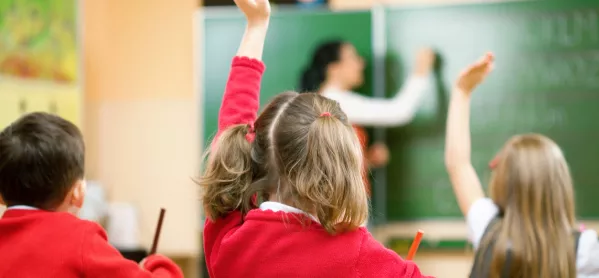- Home
- Has Covid turned us all into trads?
Has Covid turned us all into trads?

The headlines, of course, are that schools are open and ready for business. The reality, once you get past the standfirst, read below the fold, and hack your way into the detail of the body text, is more complex.
Schools may be open, but they are changed. Not only that, but the virus’ malignant, mischievous influence has reached into every classroom, changing how teachers teach and children learn.
The physical changes are familiar to all of us adapting to this Covid world: the ubiquitous hand sanitisers, the masks, the one-way systems that guide us on often bizarre and circuitous routes from one place to another, the socially distanced lunch queues - you know and loathe them all.
But these all take on additional levels of frustration when applied to a school: forgetting your mask, two minutes before the start of a lesson, halfway down a corridor with an armful of books and a hundred children walking behind you, presents different problems than it does in the office (whatever that is). Cleaning school desks, wiping down keyboards in every classroom for every lesson: such things add to the daily detritus that has been heaped on all of us since March.
The prosaic clutter created to keep us all safe builds, incrementally, until you can’t see what you - and the world around you - was once like.
The impact of the coronavirus on teaching
These alterations are visible and necessary if we are to keep schools functioning. But perhaps the more significant changes are harder to see, and will last much longer than the arrows stencilled into the corridor floors.
The debate about the long-term impact of keeping schools shut continues, and will return with greater urgency if a second national lockdown is imposed. But a quieter, more nuanced discussion will eventually develop around the implications of the sudden, altered pedagogies that have been forced into every scheme of work and lesson plan.
Teachers are teaching differently now, and many are doing so in a way that they are unused to, and uncomfortable with. The virus has robbed us of many things, but perhaps it is agency and spontaneity that are so sorely missed, and nowhere more so than in the classroom.
The ties teachers create with their classes are made of many strands, but chief among them is the ability to respond instinctively, to move around the classroom, bend down next to a student who is stuck on a question, talk one-to-one, on a human level. That is quickly disappearing, evaporating into the social distance. Increasingly, everything is planned, mapped-out, restricted.
An educational wintering
The coronavirus has made us all trads: pair work, group work, presentations, Socratic dialogues, Harkness teaching; all these and other forms of child-centred learning have either been savagely curtailed or have gone from the Covid classroom.
The teacher sits or stands pinned inside a marked-out square, which keeps them at least two metres from the front row (and, yes, it is always now a row) of the class. It is difficult to “own the room” when you can’t leave your desk or even think of being outside that box. For many, the back of the classroom is on a permanent quarantine list, as far away as a carefree holiday in Spain right now.
No doubt, given what they have had to live through, many students will be grateful for simply being in school. But their teachers, rather than them, will know what they continue to be denied: the science practicals not done, the drama productions not chosen, the sports fixtures left unarranged, the field trips relegated to a YouTube video, the activities, across year groups, cancelled in the mind before they were ever planned on paper.
We are in danger of entering an educational wintering, creating a landscape, once so rich and varied, razed to stubble.
So we have to be sure that what we are losing can be brought back. School leaders have to ensure that the seeds of invention survive in this harsh environment. They have to find every opportunity to kindle, wherever possible, their staff’s desire to remain inventive, and to take risks in their teaching so that they feel empowered to promote curiosity and enquiry in every student they teach.
Schools have to continue to be places where risk is taken, and energy fills every classroom. The current crisis should not be an excuse for didactic, chalk-and-talk lessons from the front, with little interaction and limited dialogue.
If this phase of the pandemic is a prolonged stunting of intellectual and academic growth, hemmed and taped in by fear, then it will be a lasting, and damaging, legacy, which we will spend too long in the future trying to overcome.
David James is deputy head of an independent school in London. He tweets as @drdavidajames
Register with Tes and you can read two free articles every month plus you'll have access to our range of award-winning newsletters.
Keep reading with our special offer!
You’ve reached your limit of free articles this month.
- Unlimited access to all Tes magazine content
- Save your favourite articles and gift them to your colleagues
- Exclusive subscriber-only stories
- Over 200,000 archived articles
- Unlimited access to all Tes magazine content
- Save your favourite articles and gift them to your colleagues
- Exclusive subscriber-only stories
- Over 200,000 archived articles



